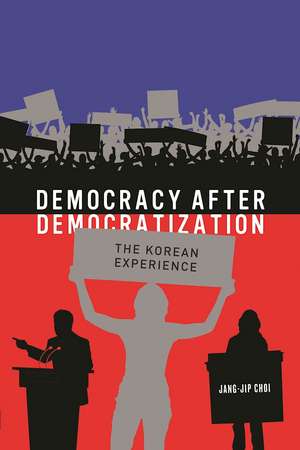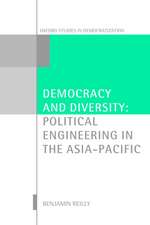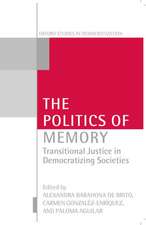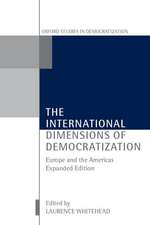Democracy after Democratization: The Korean Experience
Autor Jang-Jip Choien Limba Engleză Paperback – 20 dec 2012
Half a century since the adoption of democracy in South Korea, the Korean people's high hopes for popular governance have not been met. There is widespread skepticism about what Korea's implementation of democracy has brought to the nation and whether it will be able to respond effectively in the future to the demands of an evolving society and world. What accounts for the conservative complacency of Korea's democratic system? Why do democratic administrations in Korea seem so incompetent? Do political parties in Korea legitimately represent the voice of civil society in legislating and policymaking on issues with a direct impact on the freedom and welfare of the people?
Taking an issue-oriented approach, renowned Korean political scientist Jang-Jip Choi endeavors to answer such questions as he examines the origins, structures, and conflicts of conservative democracy in South Korea as well as democratization's impact on the state, economy, and civil society.
Taking an issue-oriented approach, renowned Korean political scientist Jang-Jip Choi endeavors to answer such questions as he examines the origins, structures, and conflicts of conservative democracy in South Korea as well as democratization's impact on the state, economy, and civil society.
Preț: 244.83 lei
Nou
Puncte Express: 367
Preț estimativ în valută:
46.85€ • 49.09$ • 38.73£
46.85€ • 49.09$ • 38.73£
Carte tipărită la comandă
Livrare economică 11-25 aprilie
Preluare comenzi: 021 569.72.76
Specificații
ISBN-13: 9781931368261
ISBN-10: 1931368260
Pagini: 350
Ilustrații: black & white line drawings, black & white tables, figures
Dimensiuni: 152 x 229 x 13 mm
Greutate: 0.32 kg
Editura: Brookings Institution Press
Colecția Shorenstein Asia-Pacific Research Center
ISBN-10: 1931368260
Pagini: 350
Ilustrații: black & white line drawings, black & white tables, figures
Dimensiuni: 152 x 229 x 13 mm
Greutate: 0.32 kg
Editura: Brookings Institution Press
Colecția Shorenstein Asia-Pacific Research Center
Notă biografică
Jang-Jip Choi is emeritus professor of political science at Korea University, author of many books and scholarly articles, and former director of the Asiatic Research Institute at Korea University.
Descriere
Half a century since the adoption of democracy in South Korea, the Korean people's high hopes for popular governance have not been met. There is widespread skepticism about what Korea's implementation of democracy has brought to the nation and whether it will be able to respond effectively in the future to the demands of an evolving society and world. What accounts for the conservative complacency of Korea's democratic system? Why do democratic administrations in Korea seem so incompetent? Do political parties in Korea legitimately represent the voice of civil society in legislating and policymaking on issues with a direct impact on the freedom and welfare of the people?
Taking an issue-oriented approach, renowned Korean political scientist Jang-Jip Choi endeavors to answer such questions as he examines the origins, structures, and conflicts of conservative democracy in South Korea as well as democratization's impact on the state, economy, and civil society.
Taking an issue-oriented approach, renowned Korean political scientist Jang-Jip Choi endeavors to answer such questions as he examines the origins, structures, and conflicts of conservative democracy in South Korea as well as democratization's impact on the state, economy, and civil society.

















